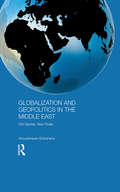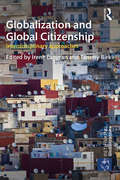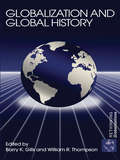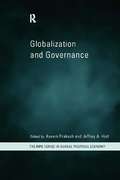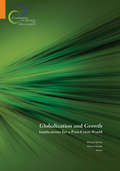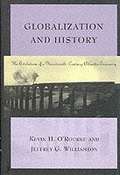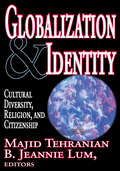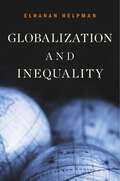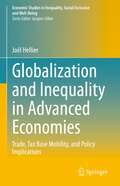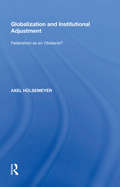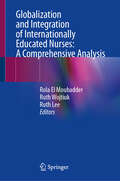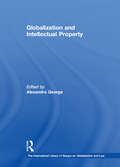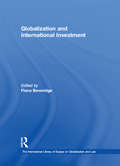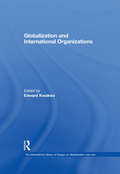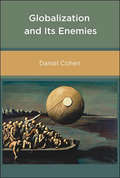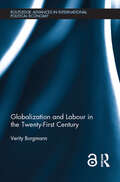- Table View
- List View
Globalization and Geopolitics in the Middle East: Old Games, New Rules (Durham Modern Middle East and Islamic World Series)
by Anoushiravan EhteshamiExamining globalization in the Middle East, this book provides a much needed assessment of the impact of globalization in the ‘greater’ Middle East, including North Africa, in the context of the powerful geopolitical forces at work in shaping the region today. Written by a well-known authority in this area, this book demonstrates that, unlike in other regions, such as East Asia, geopolitics has been a critical factor in driving globalization in the Middle East. The author argues that whereas elsewhere globalisation has opened up the economy, society, culture and attitudes to the environment; in the Middle East it has had the opposite effect, with poor state formation, little interregional trade, foreign and interregional investment, and reassertion of traditional identities. This book explores the impact of globalization on the polities, economies and social environment of the greater Middle East, in the context of the region’s position as the central site of global geopolitical competition at the start of the twenty-first century.
Globalization and Global Citizenship: Interdisciplinary Approaches (Rethinking Globalizations)
by Irene Langran Tammy BirkGlobalization and Global Citizenship examines the meaning and realities of global citizenship as a manifestation of recent trends in globalization. In an interdisciplinary approach, the chapters outline and analyse the most significant dimensions of global citizenship, including transnational, historical, and cultural variations in its practice; foreign and domestic policy influences; and its impact on personal identities. The contributions ask and explore questions that are of immediate relevance for today’s scholars, including: How does globalization in its current form present a new set of challenges for states, non-state actors, and individual citizens? How has globalization diminished, expanded, or complicated notions of citizenship? What rights could exist outside the context of state sovereignty? How can social accountability be imagined beyond the borders of towns, cities, or states? What forms of political representational legitimacy could be productive on the global level? When is it useful, possible or desirable for individuals to identify with global political communities? Drawing together a broad range of contributors and cutting edge research the volume offers chapters that seek to reflect the full spectrum of approaches and topics, providing a valuable resource which highlights the value of an extended and thoughtful study of the idea and practice of global citizenship within a broader consideration of the processes of globalization. It will be of great use to graduates and scholars of international relations, sociology, and global studies/affairs, as well as globalization.
Globalization and Global History (Rethinking Globalizations #Vol. 3)
by William R. Thompson Barry K. GillsGlobalization and Global History argues that globalization is not an exotic and new phenomenon. Instead it emphasizes that globalization is something that has been with us as long as there have been people who are both interdependent and aware of that fact. Studying globalization from the vantage point of long-term global history permits theoretical and empirical investigation, allowing the authors collected to assess the extent of ongoing transformations and to compare them to earlier iterations. With this historical advantage, the extent of ongoing changes - which previously appeared unprecedented - can be contrasted to similar episodes in the past. The book is divided into three sections. The first focuses on how globalization has been written about from a historical perspective. The second part advances three different takes on how best to view globalization from a very long-term stance. The final section continues this interpretative thread by examining more narrow aspects of globalization processes, ranging from incorporation processes to systemic disruptions.
Globalization and Global Justice
by Nicole HassounThe face of the world is changing. The past century has seen the incredible growth of international institutions. How does the fact that the world is becoming more interconnected change institutions' duties to people beyond borders? Does globalization alone engender any ethical obligations? In Globalization and Global Justice, Nicole Hassoun addresses these questions and advances a new argument for the conclusion that there are significant obligations to the global poor. First, she argues that there are many coercive international institutions and that these institutions must provide the means for their subjects to avoid severe poverty. Hassoun then considers the case for aid and trade, and concludes with a new proposal for fair trade in pharmaceutical and biotechnology. Globalization and Global Justice will appeal to readers in philosophy, politics, economics and public policy.
Globalization and Governance (RIPE Series in Global Political Economy #Vol. 1)
by Aseem Prakash Jeffrey A. HartGlobalization and Governance is a completely up-to-date, impartial survey of a variety of perspectives on what constitutes governance and how globalization may impact governance and the state. Eleven essays and a thorough introduction provide a theoretical framework and a literature overview. Unlike most books on the subject, this does not espouse any ideological agenda and examines the topical subject of globalization in a conceptually rigorous way.
Globalization and Growth Implications for a Post-crisis World
by Michael Spence Danny Leipziger*What were the causes of the financial and economic crises of 2008-2009? *What intellectual and policy mistakes prevented academics and policymakers from anticipating the crisis? *What is the future of financial regulation-both domestic and international? *What role did global macroeconomic imbalances play in the run-up to the crisis? *What is the future of the export-led growth model and what are the implications for developing countries? *To what extent will government remain involved in the economy as a result of the crisis? *What is state of infrastructure policy and the outlook for growth-promoting infrastructure spending? *What is the appropriate role of countercyclical fiscal policy in stimulating growth? *What are the long term challenges to growth? *How will climate change dynamics affect developing country growth in the future? *How will evolving demographic trends affect labor markets and what are possible policy steps to mitigate projected declines in economic growth? This book has been prepared for the Commission on Growth and Development to evaluate the prospects for economic growth in developing countries in the wake of the world financial and economic crises of 2008-2009. It considers a range of questions, particularly with regard to the future of globalization and the policy implications of the crisis. It considers the important issues pertaining to short-term, medium-term, and long-term growth and puts forward the latest policy ideas for fostering sustained economic growth in the developing world. Written by prominent academics, policymakers, and practitioners, the contributions to 'Globalization and Growth' seeks to create a better understanding of the evolving dynamic of globalization and economic growth, with particular regard to developing countries, and to inform policy makers of possible policy levers to address central concerns in this area.
Globalization and History: The Evolution of a Nineteenth-Century Atlantic Economy
by Jeffrey G. Williamson Kevin H. O'RourkeIn Globalization and History, Kevin O'Rourke and Jeffrey Williamson present a coherent picture of trade, migration, and international capital flows in the Atlantic economy in the century prior to 1914.
Globalization and Human Rights
by Jesús Ballesteros Encarnación Fernández Ruiz-Gálvez Pedro TalaveraGlobalisation turns out to be untenable because it does not guarantee minimum social equity, peace and respect for the environment, and therefore does not guarantee the effective accomplishment of human rights. This book analyzes this issue and raises proposals for a new perspective. The first part describes the soft threats to human rights, derived from the devaluation of the politics and the productive economy with regard to the finance. It entails the concealment of the reality in the shape of exploitation as the tax havens and in the shape of marginalization of the persons with different abilities. The second part include a study of hard threats to human rights and examines two cases of failed states: Afghanistan and Somalia, in which the violence has supplanted the politics and the economy. In view of these situations it is necessary to rethink the force of classic ius gentium and the humanitarian right. The third part presents the European Union as a legal and political space in which conditions of a worthy life are better defended by means of the Primacy of Practical Reason and Social State of Law, and by the requirement of peace as the main rule of international relations.
Globalization and Human Rights in the Developing World
by Derrick M. Nault Shawn L. EnglandFocusing on world regions where human rights abuses are the most serious, extensive and sustained; this book fills a crucial gap in our knowledge of the difficulties and promise of promoting human rights in our global age.
Globalization and Identity: Cultural Diversity, Religion, and Citizenship
by Majid Tehranian B. Jeannie LumIn the first decade of the twenty-first century, globalization and identity have emerged as the most critical challenges to world peace. This volume of Peace & Policy addresses the overarching question, "What are the effects of globalization in the areas of culture, ethnic diversity, religion, and citizenship, and how does terrorism help groups attain a sense of global identity?"Part I, "Citizenship in a Globalizing World," reexamines globalization in light of the traditions from which human civilizations have evolved. Linda Groff focuses on Samuel R. Huntington's thesis that the Cold War would be followed by a clash of civilizations. Joseph A. Camilleri traces the history of the concept of citizenship and its transformation through the ages to modern times. Kamran Mofid argues that the marketplace is not just an economic sphere but one where economic and business interests must embrace the spiritual assets of the community. Majid Tehranian raises the problem of identity and advocates the assumption of global identity, responsibility, and citizenship. Part II, "Convergence in Global Cultures," explores the complex issues of diversity in religions. Christopher Leeds, Vladimir Korobov, and Bharapt Gupt show how the reconceptualization of the world both geographically and regionally can recreate new sensibilities needed to overcome differences. Part III, "Divergence in Global Conflicts," discusses the multiple dimensions of the globalizing effects of economic expansion and political strife experienced by different cultures at local and regional levels. Audrey Kitigawa and Ade Ogunrinade use Nigeria as an example of political manipulation of religious and ethnic groups to divert attention from the real problems of social and economic marginalization. Fred Riggs looks at how the Web has become a medium in the globalization of religious movements.The authors maintain that continuing efforts for dialogue across cultural and religious boundaries in today's
Globalization and Inequalities: Complexity and Contested Modernities
by Sylvia WalbyHow has globalization changed social inequality? Why do Americans die younger than Europeans, despite larger incomes? Is there an alternative to neoliberalism? Who are the champions of social democracy? Why are some countries more violent than others? In this groundbreaking book, Sylvia Walby examines the many changing forms of social inequality and their intersectionalities at both country and global levels. She shows how the contest between different modernities and conceptions of progress shape the present and future. The book re-thinks the nature of economy, polity, civil society and violence. It places globalization and inequalities at the centre of an innovative new understanding of modernity and progress and demonstrates the power of these theoretical reformulations in practice, drawing on global data and in-depth analysis of the US and EU. Walby analyses the tensions between the different forces that are shaping global futures. She examines the regulation and deregulation of employment and welfare; domestic and public gender regimes; secular and religious polities; path dependent trajectories and global political waves; and global inequalities and human rights.
Globalization and Inequality
by Elhanan HelpmanGlobalization is not the primary cause of rising inequality. That is the conclusion of this penetrating study by Elhanan Helpman, a leading expert on international trade. If we wish to curb inequality while protecting what is best about globalization, he shows, we must start with a clear view of how globalization does, and does not, shape our world.
Globalization and Inequality in Advanced Economies: Trade, Tax Base Mobility, and Policy Implications (Economic Studies in Inequality, Social Exclusion and Well-Being)
by Joël HellierThis volume surveys and combines the different dimensions of globalization so as to propose a general diagnosis of the way they interact to explain growing inequality in advanced economies. The extant economic literature has widely analyzed (i) the impact on inequality of trade between advanced and emerging countries (North-South Trade), particularly offshoring, (ii) the impact of tax base mobility on tax competition and (iii) the globalization-driven constraints on social policies and labor market institutions. Those three strands of analysis and the related literature have been reviewed in a number of surveys but have not been combined to provide an extensive study of the impact of their interactions on inequality. This volume fills that gap. Providing a general diagnosis of the globalization-inequality nexus within advanced economies and opening new avenues for research and potential reforms, this book will be of interest to researchers and students of economics and the social sciences.
Globalization and Inequality in Emerging Societies
by Boike RehbeinThis volume studies the relation between globalization and inequalities in emerging societies by linking Area and Global Studies, aiming at a new theory of inequality beyond the nation state and beyond Eurocentrism.
Globalization and Institutional Adjustment: Federalism as an Obstacle?
by Axel H�lsemeyerCombining the disciplines of international political economy, public sector economics and comparative politics, this stimulating book debates whether federalism obstructs institutional adjustment under conditions of a globalized economy, or whether this depends upon the extent to which a given political system is centralized. Axel Hülsemeyer analyzes the ratification of the Single European Act and the Maastricht Treaty, and contrasts these with the implementation of the bilateral free trade agreement between the United States and Canada as well as the NAFTA. Preferential trade agreements themselves are conceptualized as the state response to economic globalization.
Globalization and Integration of Internationally Educated Nurses: A Comprehensive Analysis
by Ruth Lee Rola El Moubadder Ruth WojtiukThis book is a guide for stakeholders in nurse migration at a time when the shortage of nurses is a global crisis and the underutilization of Internationally Educated Nurses (IEN) a major factor. Each chapter offers perspectives on the migration processes and pathways impacting IEN integration in Canada, USA, Finland, Australia & the UK—top destination countries. Through a comparison of strengths and obstacles, we learn what works for the purpose of global replication. Issues considered include: Decision factors when choosing a destination country or a second migration Licensing processes Strategies to assist in navigating the licensure process and achieving sustained employment Actions stakeholders need to adopt to support retention and ethical recruitment Solutions and recommendations for streamlining migration and integration. This book focuses holistically on integration measures that impact IENs—families, workforce, healthcare, economies, and migration—<span lang="EN-CA" style="font-size: 12.0pt; font-family: 'Times New Roman',serif; mso-fareast-fo
Globalization and Intellectual Property (The International Library of Essays on Globalization and Law)
by Alexandra GeorgeIntellectual property laws have become intricately entwined with discussions about globalization. This volume deals with the politics, economics and effects of global intellectual propertization. It provides essays covering key issues including the international relations of global intellectual propertization, the TRIPS Agreement and the tying of intellectual property issues to international trade negotiations, contentions that global intellectual propertization is a form of post-colonial neo-imperialism, globalization's effects on intellectual property law's classic doctrines and rationales and the cultural effects of global intellectual propertization.
Globalization and International Investment (The International Library of Essays on Globalization and Law)
by Fiona BeveridgeThis volume brings together a broad range of articles on international law and foreign investment which together provide a contemporary overview of the diverse range of issues and perspectives which continue to exercise policy-makers and scholars alike. Central to this collection is the tension between market-oriented reforms on the one hand, raising issues of market access and protection of investors, and corporate social responsibility discourses on the other, raising concerns about environmental protection and respect for human and labour rights. Regional perspectives on these issues reveal differing priorities and approaches.
Globalization and International Organizations (The International Library of Essays on Globalization and Law)
by Edward KwakwaThe last few years have witnessed several significant developments in respect of international organizations, most of which are best encapsulated in the word "change". In particular, international organizations have moved from their traditional role of facilitator of the activities of their members, to that of director of their own activities. As a result, there is increased scrutiny over issues relating to the governance, control, accountability and the privileges and immunities of international organizations. These subjects are all the focus of this book. Edward Kwakwa has collected together the best published work by leading authorities in the field on subjects of crucial importance and relevance to international organizations, particularly in the context of today's ever-increasing globalization. This book is of interest to scholars and students of law, as well as government and non-government practitioners and international civil servants.
Globalization and Its Discontents
by Joseph E. StilgitzWhen it was first published, this national bestseller quickly became a touchstone in the globalization debate. Renowned economist and Nobel Prize winner Joseph E. Stiglitz had a ringside seat for most of the major economic events of the last decade, including stints as chairman of the Council of Economic Advisers and chief economist at the World Bank. Particularly concerned with the plight of the developing nations, he became increasingly disillusioned as he saw the International Monetary Fund and other major institutions put the interests of Wall Street and the financial community ahead of the poorer nations. Those seeking to understand why globalization has engendered the hostility of protesters in Seattle and Genoa will find the reasons here. While this book includes no simple formula on how to make globalization work, Stiglitz provides a reform agenda that will provoke debate for years to come. Rarely do we get such an insider's analysis of the major institutions of globalization as in this penetrating book. A new foreword for this edition.
Globalization and Its Enemies
by Daniel CohenThe enemies of globalization--whether they denounce the exploitation of poor countries by rich ones or the imposition of Western values on traditional cultures--see the new world economy as forcing a system on people who do not want it. But the truth of the matter, writes Daniel Cohen in this provocative book, may be the reverse. Globalization, thanks to the speed of twenty-first-century communications, shows people a world of material prosperity that they dowant--a vivid world of promises that have yet to be fulfilled. For the most impoverished developing nations, globalization remains only an elusive image, a fleeting mirage. Never before, Cohen says, have the means of communication--the media--created such a global consciousness, and never have economic forces lagged so far behind expectations. For the poorest countries of the world, writes Cohen, the problem is not so much that they are exploited by globalization as that they are forgotten and excluded.
Globalization and Its Enemies
by Daniel CohenA provocative argument that the frustrations of globalization stem from the gap between the expectations created and the lagging economic reality in poor countries.The enemies of globalization—whether they denounce the exploitation of poor countries by rich ones or the imposition of Western values on traditional cultures—see the new world economy as forcing a system on people who do not want it. But the truth of the matter, writes Daniel Cohen in this provocative account, may be the reverse. Globalization, thanks to the speed of twenty-first-century communications, shows people a world of material prosperity that they do want—a vivid world of promises that have yet to be fulfilled. For the most impoverished developing nations, globalization remains only an elusive image, a fleeting mirage. Never before, Cohen says, have the means of communication—the media—created such a global consciousness, and never have economic forces lagged so far behind expectations. Today's globalization, Cohen argues, is the third act in a history that began with the Spanish Conquistadors in the sixteenth century and continued with Great Britain's nineteenth-century empire of free trade. In the nineteenth century, as in the twenty-first, a revolution in transportation and communication did not promote widespread wealth but favored polarization. India, a part of the British empire, was just as poor in 1913 as it was in 1820. Will today's information economy do better in disseminating wealth than the telegraph did two centuries ago? Presumably yes, if one gauges the outcome from China's perspective; surely not, if Africa's experience is a guide. At any rate, poor countries require much effort and investment to become players in the global game. The view that technologies and world trade bring wealth by themselves is no more true today than it was two centuries ago. We should not, Cohen writes, consider globalization as an accomplished fact. It is because of what has yet to happen—the unfulfilled promises of prosperity—that globalization has so many enemies in the contemporary world. For the poorest countries of the world, the problem is not so much that they are exploited by globalization as that they are forgotten and excluded.
Globalization and Japanese Exceptionalism in Education: Insiders' Views into a Changing System (Routledge Research in International and Comparative Education)
by Ryoko TsuneyoshiGlobalization is the most common overriding characteristic of our time, with societies all over the world struggling to change their educational systems to meet what are perceived to be the needs of globalization. This book provides an insider's account of how the Japanese educational system is trying to meet that challenge while placing the developments in a larger international context. Distinguishing itself from other books in the same genre, this volume (1) brings in the diversity of insiders‘ reactions concerning globalization reform in education, while placing such actions in the larger international context, and (2) covers a wide span of education (elementary to higher education) and shows how the globalization reforms as a whole are affecting Japanese education. With a focus on insiders’ accounts, this book brings in information that is little known outside of Japan. It also links globalization processes in Japanese society, school education and higher education, accounting for similarities and differences across educational levels, providing insight into the multifaceted processes affecting the Japanese education system. Chapters include: From High School Abroad to College in Japan: The Difficulties of the Japanese Returnee Experience The University of Tokyo PEAK Program: Venues into the Challenges Faced by Japanese Universities Why Does Cultural Diversity Matter? Korean Higher Education in Comparative Perspective
Globalization and Labour in China and India
by Paul Bowles John HarrissGlobalization has pushed China and India to the centre of the stage but what has been the impact on workers in these countries? This book demonstrates the complexity of the processes and responses at play. There are signs that both states are shifting their role in a 'counter movement from above'. But will this be enough to quell the social unrest?
Globalization and Labour in the Twenty-First Century (Routledge Advances in International Political Economy)
by Verity BurgmannThe Open Access version of this book, available at http://www.tandfebooks.com, has been made available under a Creative Commons Attribution-Non Commercial-No Derivatives 3.0 license.Globalization has adversely affected working-class organization and mobilization, increasing inequality by redistribution upwards from labour to capital. However, workers around the world are challenging their increased exploitation by globalizing corporations. In developed countries, many unions are transforming themselves to confront employer power in ways more appropriate to contemporary circumstances; in developing countries, militant new labour movements are emerging. Drawing upon insights in anti-determinist Marxian perspectives, Verity Burgmann shows how working-class resistance is not futile, as protagonists of globalization often claim. She identifies eight characteristics of globalization harmful to workers and describes and analyses how they have responded collectively to these problems since 1990 and especially this century. With case studies from around the world, including Greece since 2008, she pays particular attention to new types of labour movement organization and mobilization that are not simply defensive reactions but are offensive and innovative responses that compel corporations or political institutions to change. Aging and less agile manifestations of the labour movement decline while new expressions of working-class organization and mobilization arise to better battle with corporate globalization. This book will be of interest to students and scholars of labour studies, globalization, political economy, Marxism and sociology of work.
